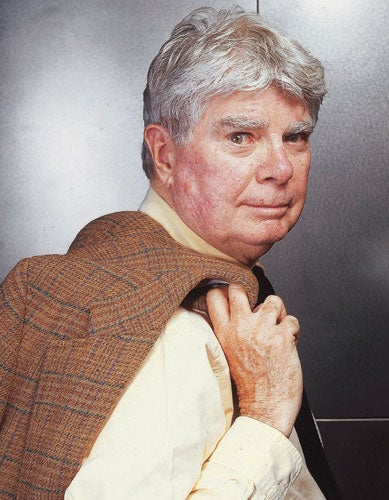New York gossip guru and bane of celebrities dies, aged 80
Tributes for James Brady, prolific writer and founder of Page Six gossip column

If gossip is the fuel that gets New Yorkers up in the morning, then yesterday they needed to give thanks to the man who – more than anyone else – ensured that supplies never run short. James Brady, who died on Monday aged 80, did many things in journalism and writing. One of them was to create a certain Page Six.
A feature of the New York Post newspaper since Rupert Murdoch bought it in 1976, Page Six has evolved into an institution as important to the New York landscape as bagel shops and Bloomingdales. For many, scanning Page Six for its titillations and ribald revelations about A-lister celebrities and the hangers-on that serve them is the first task of the day.
"New York," the writer Jay McInerney observed, "is divided between those who turn to Page Six to read about their neighbours and those who do so to read about themselves".
Arena magazine once noted that its daily dose of scurrilous tidbit-trading "can launch a bestseller, break a contract, fill a restaurant and even end a marriage". Surely there was never a gossip column with such power.
To be remembered first for his connection to Page Six may not be what Mr Brady would have wanted for himself. His career was much more than that. Awarded a Bronze Star for his bravery in the Korean War, he wrote several books about what is sometimes still called America's forgotten conflict, as well as whimsical novels set in East Hampton, the beachside Long Island enclave of the rich and spoiled.
After starting out as a copy boy with the Daily News, Mr Brady blazed a trail across the magazine and newspaper firmament. He worked as the correspondent in London and in Paris for Fairchild publications; he wrote for and ended up being publisher of Women's Wear Daily; he edited Harpers Bazaar and New York Magazine; and for the last 25 years penned a celebrity column for Parade.
There is some debate about who exactly fathered Page Six. Mr Murdoch originally hired Brady to edit The Star, a weekly supermarket tabloid. But in early 1977 he brought Brady into the New York Post building as the first editor of Page Six, though he remained barely a day on the job. He did, however, return to it as its top contributor.
Mr Murdoch himself may lay claim to having fathered Page Six, or possibly the late Neil Travis. Brady himself, however, used to maintain that Page Six had indeed been his idea and yesterday his old newspaper gave him the benefit of the doubt in a tribute.
Over the years, Page Six, edited since 1985 by Richard Johnson, has continued unabashedly to wallow in the woes of the famous and poke the pampered and the pompous. Among its finest moments perhaps was its relentless pursuit of Monica Lewinsky, whom it labelled the "Portly Pepperpot", and the revelation that George Schultz, the former Secretary of State, has a tiger tattoo on his buttock.
And some of the biggest Post scoops over the years saw first light in the column inches of Page Six. They include Donald Trump's philanderings and subsequent marriage to Marla Maples, a tip-off about Woody Allen's affair with Soon-Yi Previn, the adopted daughter of his then partner Mia Farrow, and the news of Britney Spears engagement to Kevin Federline.
What Page Six achieved – up to and including the tricky art of the blind item where readers are informed of bad behaviour of famous people with little hints as to their identity but no names – has gradually filtered, for better or worse, into almost every corner of the media universe.
Join our commenting forum
Join thought-provoking conversations, follow other Independent readers and see their replies
Comments
Bookmark popover
Removed from bookmarks